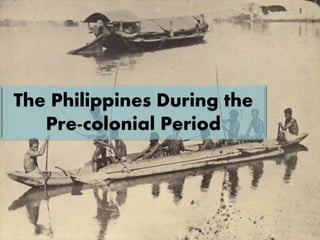
The philippines during the pre colonial period
- 1. The Philippines During the Pre-colonial Period
- 2. Peopling of the Philippines ‘Land bridge’ Theory Up to the early 1970s, it had been assumed that the Philippines was a part of mainland China. It was theorized that during the Pleistocene or Ice Age, the waters surrounding what is now the Philippines fell about 156 feet below the present levels. As a result, a vast area of land was exposed and became sort of land bridges to the mainland of Asia.
- 3. Peopling of the Philippines Dr. Voss’ study In February 1976, however, this theory of the “land bridges” to Asia was disputed by Dr. Fritjof Voss, a German scientist who studied the geology of the Philippines. According to Dr. Voss, the Philippines was never a part of the mainland of Asia but that it arose from the bottom of the sea and “continues to rise as the thin Pacific crust moves below it.”
- 4. As proof that the Philippines was never a part of the Asia mainland, Dr. Voss points to the fact that when scientific studies were done in 1964-67 on the thickness of the Earth’s crust it was found out that the 35-kilometer thick crust underneath China does not extend to the Philippines.
- 5. Hence, the later could not have been a part or “land bridge” to the mainland of Asia. On the other hand, the Philippines lies “along the great earth faults extending to deep undersea trenches” and so through violent earthquakes what is now Philippines rose to the surface of the sea.
- 6. Theories on the Origin of the Filipino People Austronesian Migration Theory Wave Migration Theory Jocano’s Theory
- 7. Jocano’s theory of earlier evolution and movement Anthropologist F. Landa Jocano of the University of the Philippines contends that what fossil evidence of ancient men show is that they not only migrated to the Philippines, but also to New Guinea, Borneo, and Australia. He says that there is no way of determining if they were Negritos at all. However, what is sure is that there is evidence the Philippines was inhabited as early as 21,000 or 22,000 years ago. In 1962, a skull cap and a portion of a jaw, presumed to be those of a human being, were found in a Tabon Cave in Palawan.
- 8. Tabon man skull remains Tabon cave in Palawan
- 9. Jocano’s theory of earlier evolution and movement The discovery may show that man came earlier to the Philippines than to the Malay Peninsula. If this is true, the first inhabitants of the Philippines did not come from the Malay Peninsula. Jocano further believes that the present Filipinos are products of the long process of evolution and movement of people.
- 10. As to the present Filipinos, Indonesians, and Malays of Malaysia, Jocano maintains that they are the “end results of both the long process of evolution and the later…..movements of people. They stand co-equal as ethnic groups, without any one being the dominant group, racially or culturally. Culturally, it is likewise erroneous to state that Filipino culture is Malay orientation. Even our historical experiences and social organization differ from those of the people identified as Malays.”
- 11. The differences, according to Jocano, are due to the differences in their responses to their environment. On the other hand, the similarities found among them are due to the adjustment to their environment. Summarizing his findings, Jocano maintains that;
- 12. 1. The peoples of prehistoric Island Southeast Asia belonged to the same population. It grew out of the combination of human evolution which occurred in Island Southeast Asia about 1.9 million years ago, as evidenced by the fossil materials recovered from different parts of the region, and of the movements of other peoples from Asia mainland during historic times.
- 13. 2. This core population shared a common cultural orientation that included both flake and core implements and their complex ceramic industries… Other shared cultural elements consist of similar ornaments, pendants, house types, belief systems, ritual complex, and funerary practices.
- 14. 4. None of these ancient men could be categorized under any of the historically identified ethnic groups (i.e., Malays, Indonesians, Filipinos) today. The Wetern colonizers were the ones who fragmented the population into ethnic groups as they partitioned the region into their respective colonies.
- 15. The British popularized, in scholarship, the term Malay to characterize the group of people they encountered in the Malay Peninsula. The Portuguese, the Germans, and the Dutch introduced the Indonesians to the Western world. The Spaniards strongly worked for the conversions of Filipinos (formerly Indios) to Christianity. Later on the Americans came and further differentiated the Filipinos from their Southeast Asian cousins.
- 16. 5. …. the explanation of the peopling of the Philippines through a series of wave migration, as documented by folk history like the Maragtas, has to be reconsidered. The undue credit given to the Malays as the original settlers of the region and dominant cultural transmitter must be corrected. Emerging from a common population with the same base culture, the Malays, the Filipinos, and Indonesians are coequal as ethnic groups in the region of Island Southeast Asia, without any one of them being racially or culturally dominant.
